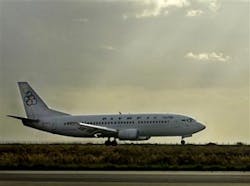Flight Attendant Tried to Save Cypriot Plane
A flight attendant tried to save a Cypriot airliner that crashed near Athens earlier this year, wrestling with controls for at least 10 minutes before the Helios Airways flight went down, investigators said Monday.
All 121 people on board were killed when the Boeing 737-300 slammed into a hillside on Aug. 14. The plane apparently lost cabin pressure, incapacitating the pilots, and eventually ran out of fuel.
Investigators Monday carried out a re-enactment of Flight 522 from Larnaca, Cyprus to Athens, to analyze the causes of Greece's worst air disaster.
Senior investigator Serafeim Kamoutsis said 25-year-old Cypriot flight attendant Andreas Prodromou entered the cockpit at least 10 minutes before the crash, while the plane was in a holding pattern and the pilots were unconscious or partially conscious.
"He tried to fly the plane manually as best as he could," Kamoutsis said, adding that it was too early to comment on how the automatic pilot was disabled.
Kamoutsis declined to say how investigators know the flight attendant tried to fly the plane. He said Prodromou, who had some pilot training, opened the cockpit door after entering the security code about 10 to 12 minutes before the crash.
Chief investigator Akrivos Tsolakis said he believed the Cypriot airliner suffered a "partial and not total loss of pressure" and that the flight attendant remained conscious because he found a portable supply of oxygen.
"This (loss of pressure) occurred during the ascent ... We are still investigating why the pilots continued their ascent and did not respond properly," Tsolakis said.
He said investigators suspected that a switch controlling the pressure had been placed on the wrong setting, but cautioned that this fact alone was not enough to explain the accident.
Last month, Tsolakis said he believed "human factors" were "broadly responsible" for the crash, but did not elaborate.
In Monday's re-enactment, special Olympic Airways flight 121 - named in honor of the victims - traced the route of the low-cost Cypriot airline from Larnaca and circled around the Aegean Sea island of Kea as jets followed behind and videotaped the flight.
Greek investigators are due to issue their first report in February, but their findings will not be made public until June, pending recommendations from other investigative agencies and Boeing.
___
Associated Press Writer George Psyllides in Larnaca, Cyprus contributed to this report.
News stories provided by third parties are not edited by "Site Publication" staff. For suggestions and comments, please click the Contact link at the bottom of this page.

